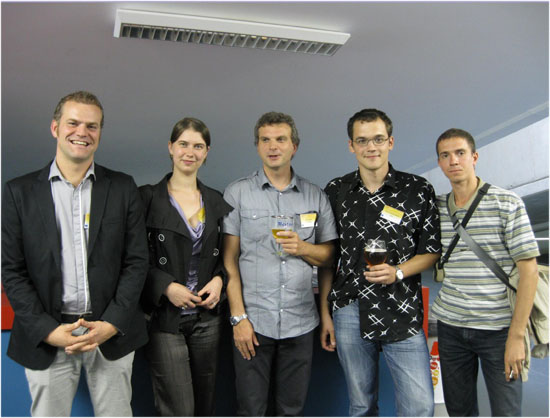|
In 2009 the program TEMPUS, that aims to modernize higher education and create an integrated educational space for the EU countries, launched the project named CRIST - "Curricula Reform in Space Technology
". The main goal of the project is a joint development and implementation of the new curriculum in the line of "Design and use of small spacecrafts: micro-and nano - satellites.
Design of microsatellite, which considers spacecrafts weighing up to 100 kg, is a new and very promising direction of the development of space technology. The development of the microsatellite of such kind for probing the earth's surface in NTUU "KPI" has been in progress since 2006, as a part of program "Space technology and robotics". Therefore, the project CRIST is very important in order to attract additional qualified specialists to work on the microsatellite.

From August 21st to September 4th, as part of TEMPUS program, the University DeNayer held summer course for representatives of eight higher education institutions from Ukraine, Russia and Kazakhstan. A group of employees and students from NTUU "KPI", specialized department of devices and aircraft control systems, Department of Aircraft and Space Systems participated in this course.
The main purpose of the journey was an extended studying based on computer aided design Pro / Engineer system and awareness of the ground control stations for the scientific satellites. Besides Professor Scholz from the TU Berlin University carried out the training on marketing.
CAD system Pro / Engineer allows to increase significantly the speed of development, design and preparation for the production of aviation and space system technique. Since this year, it has been implemented into the educational process at the department of aircraft and space systems. Tuition is held in the new computer class, that was opened by the TEMPUS program .
Within the constraints of the courses, excursions were provided, such as excursion to the marine traffic control center in Antwerp, the satellite tracking station in Redu, to the corporation QinetiQ Space, and the European Space Center.
On the 24th of August the coordination meeting with the representatives of universities and project organizers CRIST was convened. During the meeting the reports from the project participants were listened to and the agenda for further action was adopted.
Internship in Belgium can be described as very productive. Employees and students of the department received a great impression not only from the scientific content, but also from the cultural life of Belgium, impressed by the beauty of Brussels, its traditions and living conditions of European countries.
Also one of the most important results of this visit was to establish friendly relations with representatives from other universities.
|

